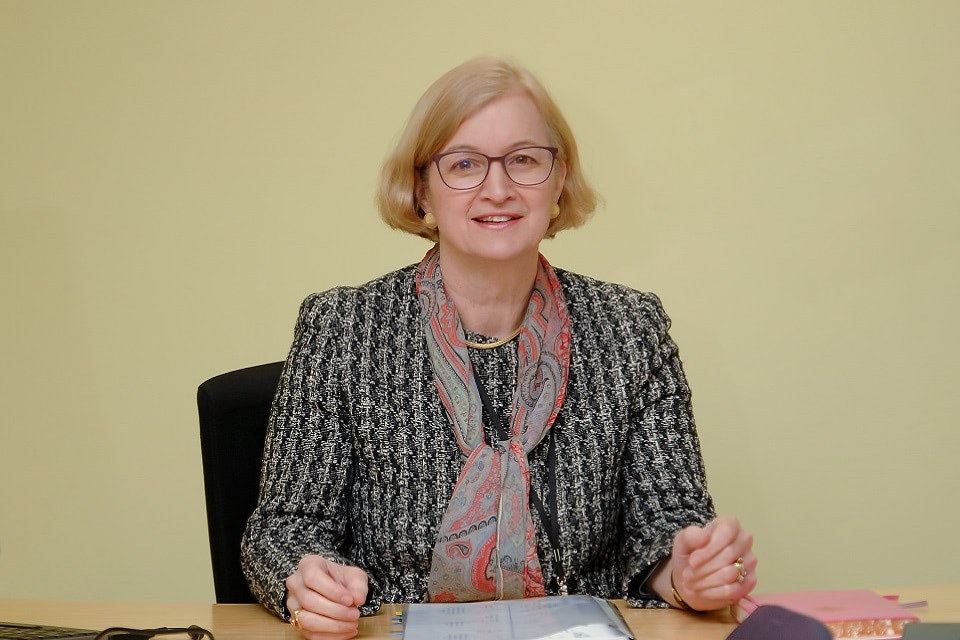Ofsted Annual Report 2020/21: Education, children’s services and skills

Ofsted’s Annual Report presents our findings for the areas we inspect in early years childcare, schools, further education and skills and social care.
The last year was a difficult period to be young, and a challenging time to be learning. The restrictions everyone had to live under brought hardships to many, but children and learners faced more than their fair share, Ofsted’s Annual Report finds.
While the long-term effects of school closures are not yet known, this year’s report says that nearly all children in England have suffered as a result of restrictions and repeated lockdowns. It warns that, as we look forward to the year ahead, it’s imperative that all parts of education and care systems are working to enable children of this generation to fulfil their potential.
The Annual Report provides a state of the nation view of education and children’s social care over the 2020 to 2021 academic year. During this period, much of Ofsted’s routine inspection work was suspended. Regulatory work continued however, and the inspectorate undertook monitoring and research visits to see first-hand how schools, colleges, nurseries, and social care providers were reacting and responding to the shifting situation brought about by the pandemic.
Ofsted found that, despite the best efforts and commitment of many thousands of parents, teachers, social workers and carers, the challenges of the pandemic were so great that nearly all children fell behind in their education, while some had a worse experience than others.
The report describes how:
- The loss of education, disrupted routine, and lack of activities led some children to develop physical and mental health problems. Loneliness, boredom and misery became endemic among the young.
- Children with special educational needs and/or disabilities (SEND) had additional barriers to overcome as many were unable to access the support they rely on.
- Vulnerable children, at risk of harm or neglect, disappeared from teachers’ line of sight, resulting in significantly lower levels of referrals to social care.
- Some children in care felt less safe due to lockdown restrictions and broken relationships with staff. In the worst cases, increased levels of anxiety led children to self-harm.
- Long-standing pressures on care placements grew, with long waiting lists and children being placed far from their families, or in unregistered homes.
- Some children attending alternative provision became involved in criminal activity, including gang violence, and were at risk of child sexual exploitation.
- The development and progress of many of the youngest children were hampered, with some even regressing in basic language and social skills.
- The further education and skills sector was hit particularly hard. Many apprentices found themselves furloughed, or out of work altogether. And the number of learners experiencing significant mental health problems or safeguarding concerns increased.
- Prisoners seeking a second chance through education were unable to leave their cells to learn. Many lost motivation and floundered, especially those with learning difficulties, low levels of education or limited English.
The Annual Report notes that, from education inspections carried out so far this term, Ofsted is beginning to see that schools and colleges with a well-planned and well-implemented curriculum are best placed to get children to where they need to be.
But for children to really regain a sense of normality in their lives and their education, it’s important the focus is not solely on bridging gaps in academic learning. Schools must offer children a rounded experience, including a rich curriculum, sport and physical activity, and extra-curricular opportunities that broaden their horizons.
The report also outlines systematic improvements and reforms that must now be taken forward in education and children’s social care, including:
- Long-standing lack of capacity in the care system, and variability in the support available for care leavers, must be tackled.
- The quality and consistency of teacher education must be improved to make sure that the new generation of teachers is set up for success in the classroom.
- Alternative provision must be reformed and the loopholes removed that allow much of it to avoid regulation and oversight.
- Legislation must be strengthened and Ofsted’s investigatory powers increased to allow inspectors to find and close illegal schools.
- Support for the most vulnerable children and those with SEND must rapidly return to pre-COVID levels. Partnerships working across local areas need to do better for the children who rely on them.
Sector Response

Ofsted’s Chief Inspector, Amanda Spielman, said:
“The education and social care sectors have been under tremendous strain since the pandemic began, and their staff have worked tirelessly in children’s interests. Their efforts deserve the highest praise.
“But the challenges of COVID-19 were so great that nearly every child has felt the impact of the resulting restrictions. Many young children’s progress and development faltered. Primary and secondary age children had their education and social lives disrupted from being in and out of school, away from their teachers and classmates. Children with SEND were unable to access the local support services they rely on. Further education students and apprentices saw their placements curtailed and job prospects limited. And children in care suffered as long-term issues in the system were exacerbated by staff shortages and isolation measures.
“In order to protect older generations, we asked the youngest generation to put their lives and education on hold. As we look forward to the year ahead, we must strive to redress the balance. Every generation gets one chance to enjoy its childhood and fulfil its potential. We must do all we can to make sure this generation is not denied its opportunity.”

Kevin Courtney, Joint General Secretary of the National Education Union, said:
“Schools need support from Government to help children to recover their learning, while continuing to deal with the impacts of Covid. Unfortunately, the Government’s response so far has been wholly inadequate; there is nothing like enough funding, and preparation for the Government’s tests in primary schools is once again starting to dominate education.
‘In these phases of recovery from the pandemic and ongoing concerns about Omicron, our schools certainly do not need an inspection regime which puts additional pressure on headteachers and school staff and refuses to acknowledge the ongoing impacts. The Government should instruct Ofsted to pause its inspection programme.
‘While the Chief Inspector reports on children’s lost classroom time over the past year, there is little in her report that challenges the Government, despite it having refused the advice of Kevan Collins – its own recovery tsar.”

Geoff Barton, General Secretary of the Association of School and College Leaders, said:
“The Chief Inspector’s bleak report provides yet more evidence of the huge impact of the pandemic on the education and wellbeing of children and young people. She finds that the challenges of the pandemic were so great that nearly all children fell behind in their education despite the best efforts of teachers, parents, carers and social workers. The loss of education and activities led to some children developing physical and mental health problems, and created additional barriers for children with special educational needs.
“Unfortunately, the government’s response to this crisis has been wholly inadequate. Its recovery plan for education is not sufficiently resourced and is predicated largely on a series of routes for delivering one-to-one and small group tuition which are overly complicated and bureaucratic. It would be far simpler and more effective to provide the funding directly to schools and colleges to deliver support as needed. It is not too late to do this and we call upon ministers once again to provide a recovery plan of the scale and ambition required.
“We would also emphasise that disruption caused by the pandemic is far from being over, and that the first step to recovery must be to establish continuity of learning. The government must provide more public health support to schools and colleges in terms of testing and improved ventilation, and Ofsted itself must do more to recognise that inspections at this time are extremely problematic. We have asked the inspectorate to allow inspections to be deferred upon request to a later date, and while it has slightly softened its criteria for deferrals, it has not gone far enough in this respect.”

Paul Whiteman, general secretary of school leaders’ union NAHT, said:
“It is true that pupils fell behind during lockdown, and there is a significant challenge going forward helping children to recover.
“But several reports have shown that good progress was made when children returned to schools in the 2021 summer term. Educators know what they are doing, and it is important that schools are allowed to focus on the strategies and programmes they know work best for the children in their schools.
“In this regard, the inspectorate offers little insight of substance and would do well to get out of the way and let schools get on with the task-in-hand. Pupils will be best served by their schools not being distracted by preparation for inspection. Right now, children need their teachers focused on teaching – responding to individual needs and adapting to the ever-changing situation on-the-ground. The best thing Ofsted could do for learners is to pause inspection and let schools get on with the job.”

Dr Patrick Roach, General Secretary of the NASUWT-The Teachers’ Union, said:
“As highlighted by Ofsted, teachers and school and college leaders pulled out all the stops during periods where schools and colleges were closed to the majority of pupils to try to maintain education remotely and ensure the wellbeing of their pupils.
“Teachers and leaders have continued to face extraordinary challenges since the reopening of schools and have gone and above and beyond for their students, often at the expense of their own health and wellbeing.
“However, it is undeniable that the pandemic has had a significant impact on pupils’ progress, development and emotional health and that it is the most deprived and vulnerable pupils that have fared worst.
“The Annual Report highlights the scale of the continuing challenge to recover pupils’ education. The NASUWT believes the starting point must be for the Government to take whatever steps are necessary to reduce further disruption to learning while Covid-19 circulates at pandemic levels. This means enhancing safety mitigations in schools through investment in ventilation, mandating greater use of face coverings and reintroducing self-isolation measures. It also means investing in supply teachers to help cover gaps where teachers are absent.
“Additionally, ministers must provide the additional funding that is needed to ensure catch up programmes will genuinely make a difference to the progress, wellbeing and achievement of pupils.
“More broadly, ensuring this generation’s education is not blighted by the pandemic means investing in the teaching workforce and providing pay, working conditions and training which will elevate teaching to its rightful position as a highly skilled and respected profession.
“Ofsted must too consider its own contribution to supporting schools as they seek to recover from during this difficult time. Inspections which only serve to heap pressure and stress on school staff will be counterproductive and distract teachers from focusing on the needs of pupils. As we emerge from the pandemic Ofsted must demonstrate that it understands the unique challenges schools are facing and is capable of offering the genuine support that is needed now and over the coming years.”











Responses